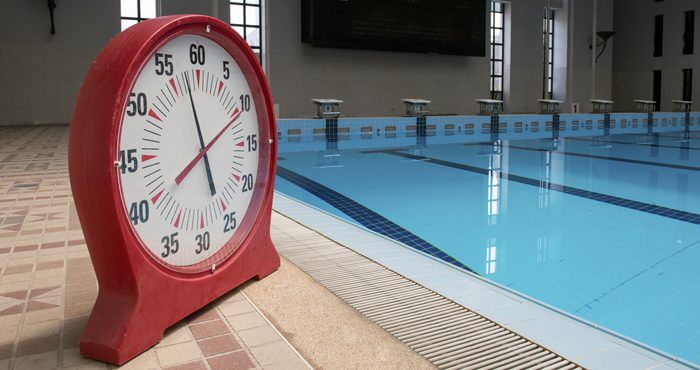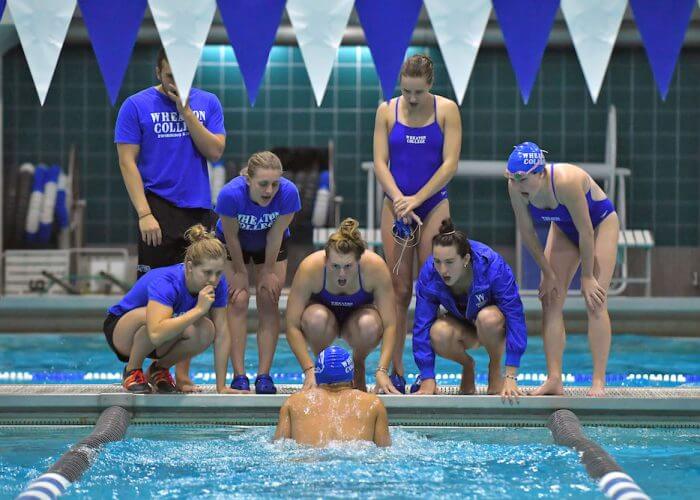5 Life Lessons Taken from the Pool to an Interview

5 Life Lessons Taken from the Pool to an Interview
It’s no secret swimming has many benefits that go beyond being in great physical shape. Most of these benefits also equip swimmers with tools for their professional future.
The skills that swimming provides span past the years of age group, high school, and college. We call them “life-long lessons” for a reason because they are useful for any point in life. Almost everyone faces the terrifying time when job applications and interviews are suddenly on the to-do list. But because swimming not only defines those muscles, but also defines who you are, job interviews can become much easier when you remember what swimming has taught you. So, when you are sitting across from an interviewer, resumé in hand, be confident in the skills you have acquired!
In short, here are 5 life lessons that you can take from the pool into an interview as well:
1. Self-Motivation
Recruiters want to see your ability to be self-motivated. Even if the job you are applying for is going to be working with a large group, or under a manager, the grit to get the job done on your own time is very desirable. All swimmers know that, while swimming can sometimes be a team sport, the majority of the time you are alone with your thoughts while your head is underwater. It takes a lot of mental toughness to push yourself when no one else is telling you to. While coaches and teammates always help, in the end, you are the only one who decides how hard you are going to work or how fast you are going to race.
You can apply this type of grit to any type of job or position. In the same way that you push yourself to sprint just one more 50, you can use that mindset for the professional world too.
2. Time Management

Photo Courtesy: Ironman
Another major topic that will most likely come up in any interview is the concept of time management. It’s not very professional to be late, or to forget about that project because you didn’t write it on your calendar. Time management is crucial in the corporate world, but thankfully, swimmers thrive at it!
It’s a wonderful thing to realize that all those 5:00 am morning practices actually paid off. Swimmers go through easily one of the most grueling training schedules, and then go to school on top of it. Athletes know that homework must be done quickly and efficiently in the two-to-three hour window after dinner and before bed, or else it won’t get done at all. Because of these tight schedules, swimming teaches you how to juggle your sport with school and social life. It makes you a pro at planning out your day to fit every little thing in. And so, this too can be applied to the professional world. Even without swim practices, the skill of being able to schedule ahead is an important one.
3. Adaptability
We’ve all been there. You show up for the swim meet and coach suddenly tells you that you’re in the 200 fly, or some other event you didn’t sign up for. You’re unprepared, but you buckle down and swim it anyway.
Being adaptable is something that most swimmers acquire over time. Life hits you with various unknowns, like the swim meet suddenly being cancelled, or the hotel breakfast not having any bananas. Swimmers have to learn how to perform even when everything isn’t going their way. Taking problems head-on and bouncing back from them is a life-long lesson that is valuable to any recruiter who you are interviewing with!
4. Coachability
It is a crucial life skill to be able to listen to advice and then improve your performance. This applies to advice from your swim coach, parent, manager, boss, or even friend. Coachability is something that swim coaches keep an eye out for, not just job recruiters. And so, this is a skill that does not pertain to all swimmers.
However, if you are an athlete who values feedback more than anything, it’s likely that you have wonderful coachablity skills. This is a very desired trait for the workplace too, as managers often like newcomers who are ready to learn the ropes. Humility is also a large part of this skill. It takes a humble person to be able to understand when someone else’s advice is going to help them. Recruiters will appreciate this skill if you believe that you have it, so be sure to mention it if you do!
5. Teamwork
One of the most obvious life lessons swimming gives us is that of teamwork. This is a major part of swimming, even if people argue that it’s an individual sport. Your teammates surround you every day, so it’s easy to make your team’s goals your own goals. In other words, you are working for an achievement that is bigger than just you.

Photo Courtesy: KEITH NORDSTROM (Wheaton Athletics)
This is true for most work settings. Recruiters will want to see that you can work with a group of other people for a common goal. This skill is a great thing to bring up in an interview, no matter how cheesy you may think it is. Swimmers can be some of the most team-oriented athletes there are, so don’t underplay it! Tell the recruiter that in the same way you give it your all as the anchor on a relay, you plan to give it your all for their team.
In summary, these are some useful tools to use on a resumé or in an interview when discussing your skills. Job applications will become much easier when you remember everything you’ve learned during your time with the sport and are confident in the skills that you possess!
All commentaries are the opinion of the author and do not necessarily reflect the views of Swimming World Magazine nor its staff.



